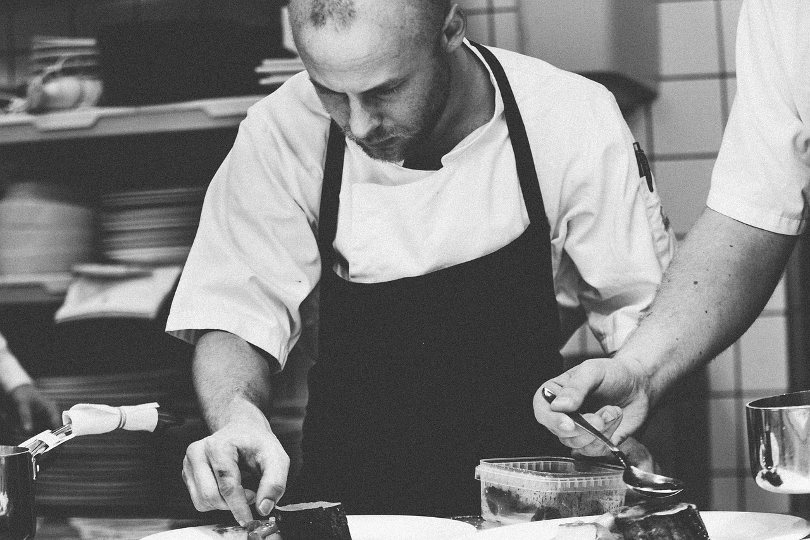Have you felt compelled after finishing a delicious meal at a restaurant to compliment the chef? I know I have, yet few consider the forgotten hero of the kitchen – the kitchen hand.
It may seem a little overdramatic; however, the tireless efforts of the kitchen hand have a massive impact on the smooth, day-to-day operations of any restaurant. Without the kitchen hands support, chefs would not manage to put those impressive meals on the table. Few realise many acclaimed chefs started their careers as kitchen hands, and it is in the kitchen where most of them discovered their love for gastronomy.
But what exactly does a kitchen hand do, and how can you determine if you have what it takes to become one?

Why kitchen hands are genuinely valued
To put it simply, experienced kitchen hands have their finger on the pulse with everything in the kitchen. They know the location of every item, the freshness of the vegetables and when supply orders are required, or if there are enough clean plates to welcome a party of 20 and serve them a 3-course meal, plus dessert.
At times, especially in smaller restaurants, the duties of the kitchen hand may go beyond the confines of the kitchen, helping with serving and table-setting. All restaurant staff, waiters and chefs included; understand the crucial role the kitchen hand plays in the smooth running of a restaurant.
Think of it this way: even the most prolific chefs rely heavily on the support they receive from kitchen hands, without them, there would not be sufficient time to think, prepare and cook the memorable meals they create.
Duties and tasks of a kitchen hand
For those desiring to become a kitchen hand, awareness of what the job entails is crucial as it does involve significantly more work than you might imagine.
The duties of a kitchen hand include;
- wash dishes and utensils and dishes
- clean food preparation areas
- lift and handle food deliveries
- store and retrieve food items and distribute to chefs
- clean kitchen equipment and benchtop appliances
- clean kitchen floors, ovens and ranges
- assist in the food preparation process
- throw out rubbish
The kitchen hand’s job is to assist in the smooth operation of the kitchen, excellent communication skills and a having a pleasant and co-operative nature is paramount along with your ability to work independently, think and act quickly and strict adherence to workplace safety.

Skills you need to master before seeking employment
Before you start sending your resume to prospective restaurants, you need to make sure you possess the set of skills necessary for every kitchen hand.
While you don’t necessarily need any form of qualification to become a kitchen hand, completing a certificate in kitchen operations certainly helps, especially if you want to get a job in a high-end restaurant. At the same time, classes in food safety or hospitality can also be a great asset.
A great approach is to develop a self-improvement mindset, keep up-to-date with industry compliance and news, read guides and articles online, further develop your skills at home or by furthering your education, and watch pro chefs at work, either on TV or online – ask questions.
TV shows such as Chef’s Table on Netflix, Hell’s Kitchen and Master Chef are a gold mine for those who want to get an idea of what working in a kitchen is like and developing your skills further. Sure, some of the situations may be overly dramatic for the sake of the show, but the speed, noise, stir, and stress are often present in a real kitchen as well.
Working conditions
I won’t try to sugarcoat it. Working in a kitchen is not easy, requiring standing for long periods and being on-the-go all day. You need to be generally active and physically strong to keep up with the job and the requirement to work long shifts – but it can also be extremely satisfying.
Kitchen hands tend to be the first to arrive, and the last to leave the kitchen to ensure the kitchen is ship-shape and ready for the next shift – depending on the restaurant shift lengths vary. Restaurants which offer breakfast, lunch and dinner menus can be the most challenging due to long hours and irregular shifts.
If the restaurant offers breakfast or lunch menus, this is the time when they might need you the most, but typically, kitchen hands work evenings and weekends, when people usually eat out.
Kitchen hands earn around $850 a week, but some end up making much more, especially if you work in a high-end restaurant. Full-time employees under the hospitality award work a 37.5 hour week, however requirements for overtime, weekends and public holidays often mean working week often require significantly more hours than worked in other industries.
Tips on remaining calm under pressure
The commercial kitchen is a hectic environment and requires working under pressure. To maintain your composure and avoid having a breakdown in front of your peers, consider the following tips;
- Sleep well: working in kitchens is physically and mentally demanding; rest is crucial to handling daily tasks – staying alert could mean the difference between completing your shift safely or ending up in the emergency ward because you mishandled a knife.
- Don’t take on all the extra shifts: sure, you may need those extra dollars at the end of the month, but continuously overburdening yourself with extra shifts each week may result in you cracking under pressure.
- Give yourself a break: if you find yourself feeling overwhelmed during a shift, find a quiet place and give yourself 5 minutes to calm down and re-centre before carrying on with your tasks.
- Show up 15 minutes earlier: arriving to work early removes the stress from your daily commute, arrive prepared and calm while allowing you time to plan out your day, grab a coffee and get well-centred before the workday grind commences.

Tips for kitchen managers on keeping kitchen hands happy
A great kitchen manager knows the true value of a competent kitchen hand and keeping all those working in the kitchen content. Friction in a kitchen can hamstring workplace efficiency and have far more significant repercussions such as lowering the standard of the food and service the restaurant delivers to customers.
Offering encouragement and praise on work well-done goes a long way, consider the physical and mental demands placed on kitchen hands daily. Understand the need for a break and time-off can go a long way in keeping good employees and avoiding friction developing within the kitchen.
Encourage them to do more while also offering them training or insights into how they can improve their skills. Show them your trust in their ability to perform delegated tasks – over managing your term can lead to them feeling suffocated and watched.
Remove those unwilling to perform or who willingly damage the cohesive spirit of your kitchen.
Final thoughts
Without a doubt, few who come to eat at a restaurant give thought to the role a kitchen hand plays in the delivery of your meal. A great kitchen-hand to a chef can be likened to a surgeon’s surgical assistant whose efforts are appreciated but rarely acknowledged.
So the next time you eat out at a restaurant and enjoy a great meal and have an overwhelming desire to congratulate the chef, stop and think about the combined efforts of all who contribute to the delivery of that experience. Consider those who take part in the preparation, cooking, and serving of your meal and offer your compliments accordingly.




